Health Inequities Seminar Series
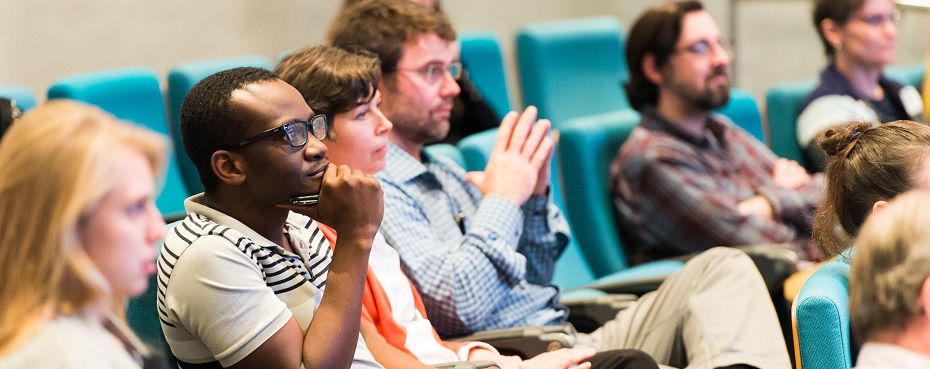
Free webinars about the impact of health inequities
CEDAR’s Health Inequities Seminar Series aims to build awareness and advance understanding about the impact systemic health inequities have on cancer early detection and treatment through interactive talks and discussion with leaders in the field. All are welcome.
Let's connect
Reach out with any questions or let us know if there's a speaker you'd recommend or a topic you'd like to see discussed here.
Past events

Presented by:
Clay Kills First, Pharm.D.
Research Assistant Professor, Division of Oncological Sciences
Clinical Oncology Pharmacist, Department of Pharmacy Cancer
OHSU Knight Cancer Institute
Thursday, Sept. 12
10-11 a.m. Pacific
Watch the recording
Native American and Alaskan Native populations have a higher incidence of pancreatic ductal adenocarcinoma than U.S. whites and the worst survival outcomes among all major U.S. racial/ethnic groups. These increased rates are poorly studied, difficult to quantify, and influenced by historical, socioeconomic, and health care structural factors. Dr. Kills First has proposed a pathway to address these disparate outcomes through increased access to high-quality cancer care and clinical trial involvement for Indigenous communities in Oregon. This presentation will discuss key elements to work successfully with Tribes, including historical influences of medical mistrust, Tribal sovereignty, and a collaborative research approach.
Dr. Kills First is an enrolled member of the Oglala Sioux Tribe and is Mnicoujou Lakota. His research seeks to uncover and highlight disparities in cancer care among Indigenous populations as well as elucidate genomic and familial factors contributing to disparate outcomes in this patient population. In addition, he strives to increase the representation of his people in medicine and works with the Northwest Native American Center of Excellence to expand its programs from the OHSU School of Medicine into the College of Pharmacy.

Presented by:
Shobha Srinivasan, Ph.D.
Senior Advisor, Office of the Director
Division of Cancer Control and Population Sciences, National Cancer Institute
Thursday, Aug. 22, 2024
10-11 a.m. Pacific
Watch the recording
Talk objectives:
- Introduce the concept of poverty and persistent poverty and its relation to health and cancer,
- Discuss how communities and populations are impacted by socioeconomic, cultural, poverty, structural racism, genetic and biological factors, and
- Assess strategies to reduce cancer disparities.
Shobha Srinivasan, Ph.D., is a sociologist and the Senior Advisor for Health Disparities in the Office of the Director, Division of Cancer Control and Population Sciences (DCCPS), National Cancer Institute (NCI). She coordinates activities across DCCPS, NCI, the National Institutes of Health, and other federal and non-governmental agencies to develop programs and initiatives to address health disparities and promote health equity. Through these NCI-funded programs, she promotes building partnerships between communities and universities to address various health challenges in underserved and immigrant communities. Previously, she has taught and conducted research at various universities and worked as a research director in a community-based health advocacy organization. Her scientific portfolio is primarily on social determinants of health, place, and inequities, including challenges in the utilization and access to health services. In all these projects, the goal is largely to inform health policy at the local, state, and national levels regarding health and health care for underserved and underrepresented populations.
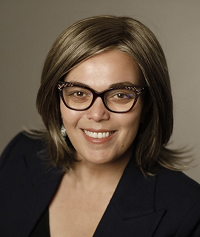
Presented by:
Bodour Salhia, Ph.D.
Associate Professor, Interim Chair
Department of Translational Genomics
Keck School of Medicine, University of Southern California
Monday, March 25, 2024
10-11 a.m. Pacific
Watch the recording
The involvement of diverse patients in translational research directly benefits patients and scientific progress. Traditionally marginalized communities have been hesitant to participate in research due to various reasons, including mistrust and lack of awareness. However, culturally appropriate outreach and engagement strategies can increase participation rates by fostering trust and awareness within these communities. One common issue is the lack of communication between researchers and participants beyond data collection, leaving participants uninformed about the outcomes of their contributions. To address this gap and enhance multi-racial recruitment, efficiency, and transparency in research, the Bench with Bedside Initiative was launched.
This initiative adopts a trans-relational approach, aiming to Recruit, Engage, and Disseminate (RED) information. Through this initiative, researchers engage with participants directly, fostering relationships and ensuring transparency in the research process. Community outreach plays a vital role in recruiting participants, utilizing multimedia and culturally sensitive approaches to reach a nationwide audience. In a study targeting breast cancer survivors, the initiative facilitated onsite or remote blood collections from a diverse cohort to validate a blood-based DNA methylation liquid biopsy for predicting cancer recurrence. Liquid biopsies, particularly those utilizing cell-free DNA methylation, offer promising noninvasive methods for disease detection and monitoring. By involving diverse populations in research, the Bench with Bedside Initiative aims to promote mutual learning, empathy, and trust, ultimately enhancing participation in translational research. This inclusivity is crucial for developing liquid biopsy technologies that can be effectively utilized across diverse populations, advancing personalized medicine and improving outcomes for all patients.
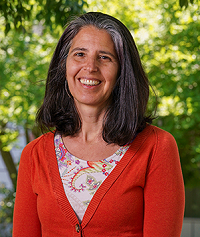
Presented by:
Laura Fejerman, M.Sc., Ph.D.
Placer Breast Cancer Endowed Chair and Professor, Department of Public Health Sciences, School of Medicine at the University of California Davis
Associate Director of Community Outreach and Engagement, UC Davis Comprehensive Cancer Center
Co-Director of Breast and Gynecological Cancers Care and Research Program (WeCARE), UC Davis Comprehensive Cancer Center
Co-Director of the Latinos United for Cancer Health Advancement Initiative, UC Davis Comprehensive Cancer Center
Thursday, Sept. 14, 2023
10-11 a.m. Pacific
Watch the recording
There are well-established disparities in breast cancer preventative behavior and outcomes by racial and ethnic identity in the U.S, that result from the interplay between structural, socioeconomic, socio-environmental, behavioral, and biological dimensions. Large research studies designed to investigate factors contributing to cancer etiology and progression have mainly focused on populations of European origin. The limitations in clinicopathological and genetic data, as well as the reduced availability of biospecimens from diverse populations, contribute to the knowledge gap and have the potential to widen cancer health disparities. In this presentation, Fejerman will discuss research on the genetic epidemiology of breast cancer in Latin Americans and U.S. Hispanic/Latinx individuals as well as share her experience with breast cancer outreach and education in Spanish-speaking Hispanic/Latinx communities.
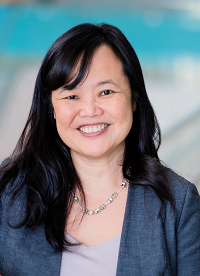
Presented by:
Scarlett Lin Gomez, M.P.H., Ph.D.
Professor, Department of Epidemiology and Biostatistics
Co-Lead, Cancer Control Program, Helen Diller Family Comprehensive Cancer Center
Director, Greater Bay Area Cancer Registry
University of California San Francisco
Monday, Aug. 21, 2023
1-2 p.m. Pacific
Watch the recording
Structural and social determinants, or drivers, of health shape the conditions and opportunities within which we work, live, and age. Cancer health disparities can arise when these conditions are inequitably distributed across population groups. This presentation will discuss approaches to conceptualize and measure structural and social determinants of health and examples of incorporating these measures into cancer health disparities research.
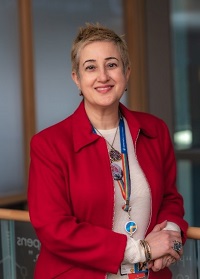
Presented by:
Navid Madani, Ph.D.
Founding Director, Science Health Education (SHE) Center, Dana-Farber Cancer Institute
Senior Scientist, Department of Cancer Immunology and Virology, Dana-Farber Cancer Institute, Departments of Microbiology and Global Health and Social Medicine, Harvard Medical School
Thursday, April 20, 2023
1-2 p.m. Pacific
The CEDAR Health Inequities Committee is delighted to host OHSU alumna Dr. Madani for this special educational seminar. Dr. Madani completed her doctoral training in the Department of Biochemistry and Molecular Biology in the OHSU School of Medicine.
In this seminar, Dr. Madani will share how she has connected her education, training, research and patient experience to address health inequities that are so devastating for women in countries of the Middle East and North Africa region. As a cancer patient herself, working in a region of the world where cancer holds incredibly engrained religious and social stigma, Dr. Madani is an advocate for understanding the patients’ lived experiences. In her talk, Dr. Madani will take the audience through lessons learned on how one’s own identities and values are directly correlated with impact as physicians, providers, and caretakers. Health is no longer uniquely clinical in definition, in fact, it is overarchingly influenced by what we cannot see, what we cannot measure, and what we often cannot even describe. It is our responsibility, however, to offer a platform and space for individuals to attempt to do so and remain open to offer our support and dedication to equity, advocacy, and best, comprehensive health for all.
Target audience: Students, trainees and early to mid-career staff.
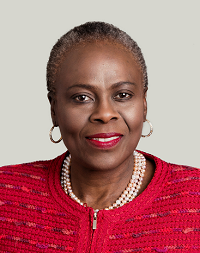
Presented by:
Olufunmilayo I. Olopade, M.D., FACP
Walter L. Palmer Distinguished Service Professor of Medicine
Professor of Human Genetics
Director, Center for Clinical Cancer Genetics and Global Health
UChicago Medicine
Friday, March 24, 2023
1-2 p.m. Pacific
Watch the recording
Risk-stratified breast cancer screening strategies are a paradigm shift from the one-size-fits-all screening approach. Previous age-based screening strategies proved to be disadvantageous to specific high-risk populations, particularly BRCA1 and BRCA2 mutation carriers and individuals of African ancestry at high risk for aggressive young onset interval breast cancers. A growing number of studies have demonstrated the diagnostic equivalency of abbreviated MRI to the full MRI protocol. We launched the Chicago Alternative Prevention Study for BReast CAncer (CAPSBRACA; clinicaltrials.gov: NCT00989638) to test the hypothesis that state-of-the-art genomic testing to identify women at increased risk, combined with state-of-the-art MRI techniques, could effectively detect and downstage aggressive interval breast cancers, and provide a personalized approach for management of high-risk women in diverse populations. I will discuss the progress of our work in population risk stratification.
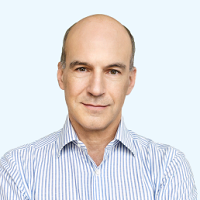
Presented by:
Peter Bach, M.D.
Chief Medical Officer, Delfi Diagnostics
Wednesday, Oct. 26, 2022
1:30-2:30 p.m. Pacific
Health policy and payment expert, pulmonary physician, and lung cancer epidemiologist, Bach has devoted his career to repairing defects in the healthcare delivery system that impede access to high-quality cancer care and working to ameliorate healthcare's cost crisis.
His work spans seminal studies including that identification of racial gaps in lung cancer care, the development of the first lung cancer risk prediction model (the "Bach model"), lead authorship on multiple lung screening guidelines, and definitional work on pharmaceutical pricing and value.
Bach previously served as senior adviser at the U.S. Centers for Medicare and Medicaid Services and mentor on many National Institutes of Health K awards. He has been elected to the National
Academy of Medicine, American Society for Clinical Investigation, and the Johns Hopkins Society of Scholars.
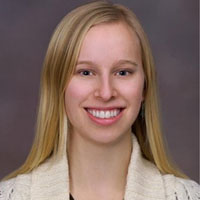
Presented by:
Melinda M. Davis, Ph.D., MCR
Associate Professor, Family Medicine and Public Health
Associate Director, Oregon Rural Practice-based Research Network (ORPRN)
Oregon Health & Science University
Wednesday, June 29, 2022
1-2 p.m. PDT
Watch the recording
Practice-based research networks (PBRNs) and community engaged research can help bridge the gap between research and practice. This talk will provide a brief history of PBRNs and practice facilitation, define participatory implementation science, and highlight rural cancer disparities with a focus on interventions to improve colorectal cancer (CRC) screening. This foundation will be used to provide an illustrative example of partnered work with rural patients, clinics, and health plans leading to an NCI-funded Cancer Moonshot award to improve CRC screening and follow-up care titled “Screening More patients for CRC through Adapting and Refining Targeted Evidence-based Interventions in Rural settings (SMARTER CRC).” Status of the pragmatic trial will be shared along with lessons learned from a decade of research in rural settings, including dynamic adaptations made in response to Covid-19.
Learning objectives:
• Define practice-based research and practice facilitation
• Identify multilevel factors contributing to rural cancer disparities
• Provide an example of participatory implementation science in action
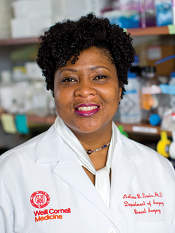
Presented by:
Melissa B. Davis, Ph.D.
Associate Professor, Department of Breast Surgery and Oncology
Scientific Director, International Center for the Study of Breast Cancer Subtypes
Member, Caryl and Israel Englander Institute for Precision Medicine
Weill Cornell Medical College
Thursday, Jan. 27, 2022
1-2 p.m. PST
Watch the recording | Password: rHX9mpES
Dr. Davis is a molecular geneticist with expertise in genomics and systems biology. Her research focuses on discerning multifocal contributions to cancer risk and disparities in clinical oncology outcomes, and on linking this information back to genetic ancestry, particularly sub-Saharan West African ancestry.
Her breast cancer research has identified that an African-ancestry allele and the recently discovered tumor expression of a gene named DARC (ACKR1) are linked to the tumor-specific immune/inflammatory response. Emerging findings from this project indicate that immune response in tumors of African Americans may be linked to worse clinical outcomes but also have potential for novel targeted therapies.
Dr. Davis discussed the latest gene signatures associated with genetic ancestry and social constructs and how these may intersect to impact clinical outcomes in breast cancer.
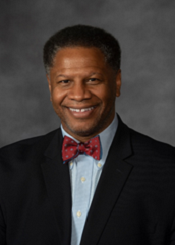
Presented by:
Robert Winn, M.D.
Director and Lipman Chair in Oncology, VCU Massey Cancer Center
Senior Associate Dean for Cancer Innovation and Professor of Pulmonary Disease and Critical Care Medicine, VCU School of Medicine
Wednesday, Oct. 20, 2021
1-2 p.m. PDT
Watch the recording | Password: eXJ4RVy9
In 2020, the AACR’s U.S. Cancer Disparities Progress Report showed that there is still a significant gap in cancer incidence and mortality between white Americans and other racial and ethnic groups. That’s not because the science hasn’t progressed or because people of color are biologically predisposed to cancer. It’s because the systems and structures put in place decades ago continue to harm the health of racial and ethnic minorities.
When COVID-19 hit, many of us were not surprised that communities of color were disproportionately affected. The current situation with COVID-19 vaccines is a great demonstration that while science is necessary for improving health, it’s not sufficient. Those amazingly effective vaccines can’t keep hospitals from being overwhelmed if a large percentage of the population won’t get the shot, just as advances in cancer screening and treatment can’t end disparities if
they’re predominantly going to wealthy white people.
This realization has been one of our blind spots as scientists and physicians. Not only must we work toward equitable access to care, but we must also work on building trust in medicine, which we do by demonstrating that we’re trustworthy. There’s a science to it, though we’re going to have to allow for greater flexibility and messiness than we’re accustomed to.